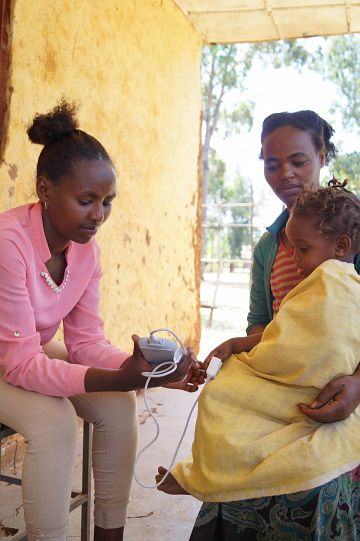Malaria Consortium awarded prestigious Independent Research Organisation status
12 February 2021 Child being assessed for fast breathing using Rad-G, Ethiopia
Child being assessed for fast breathing using Rad-G, EthiopiaMalaria Consortium is delighted to have been awarded Independent Research Organisation (IRO) status, making it one of only two international non-governmental organisations to hold this status in the UK. The IRO status recognises the contribution of Malaria Consortium’s research in developing and testing new approaches to help reduce the burden of malaria, neglected tropical diseases, other childhood illnesses, and more recently in response to COVID-19.
“Research is central to our work and we’ve spent 18 years generating evidence through robust research from a range of geographies, transmission settings and health systems, continuously improving the design and delivery of our programmes and their impact on policy and practice.
“To have been awarded this prestigious status is a welcome endorsement that speaks to the rigour, integrity and value that Malaria Consortium’s high quality evidence brings. It will enable us to broaden the scope of our research across countries grappling with a high disease burden, as well as those striving for elimination, and build partnerships with national research institutions in sub-Saharan Africa and Asia. We’re proud to continue to contribute our evidence and help shape responses to some of the most pressing global health challenges, never more so than at this time.” Jane Achan, Senior Research Advisor, Malaria Consortium.
Malaria Consortium’s research aims to understand and formulate solutions to complex public health challenges - including access to healthcare, the quality of services and the safety and effectiveness of medicines and diagnostics - by developing and testing practical solutions particular to a health system or that addresses a problem common to several countries in a region. This is achieved through a number of approaches, including operational, clinical, health systems and health services research, as well as product development and testing, laboratory-based studies and surveillance. Most of Malaria Consortium's projects have a research component and, while some studies may be standalone, the majority of research is embedded in programmes to reduce disease burden and promote child and maternal health.
A cornerstone of Malaria Consortium’s research is engagement with ministries of health in low- and middle-income countries to ensure the work aligns with national strategies and priorities. This joined-up approach to generating high-quality, highly-relevant evidence enables global and national policymakers to make data-informed decisions that help strengthen the continued delivery of essential health services.
Malaria Consortium’s researchers draw on diverse backgrounds and experiences and are skilled in their ability to pinpoint research questions that matter most for programmes and align with national priorities. Research findings from projects are routinely published in international, peer-reviewed journals and put into practice or implementation at scale within health systems.
Find out more about Malaria Consortium’s research work in their Research Capacity statement or on the research area of the website.
Keywords: Research
Latest news
- Malaria Consortium honoured by Ugandan government for contribution to combat malaria23rd April 2024
- International summit calls for AMR accountability in public health interventions21st March 2024
- Global SMC community celebrates new milestone at SMC Alliance Annual Meeting in Nigeria6th March 2024
- Scaling up key interventions could halve pneumonia-related childhood mortality13th February 2024
- Malaria Consortium and eGov Foundation join Mozambique’s national malaria programme to digitalise seasonal malaria chemoprevention campaigns8th February 2024
- World’s first malaria vaccine rollout launched in Cameroon22nd January 2024